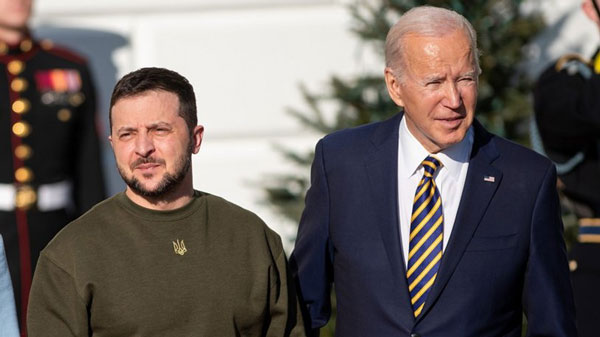
COMMENT | Kaushik Basu | Ukraine’s failure to secure an invitation to join NATO during the alliance’s annual summit in Vilnius, Lithuania, has disappointed many, including Ukrainian President Volodymyr Zelensky. But although the summit’s concluding statement did not offer a definitive timetable for Ukrainian accession, it did demonstrate a degree of unity and strategic foresight that would have been impossible had Donald Trump still been president of the United States.
To be sure, NATO leaders’ promise to extend an official invitation to Ukraine “when Allies agree and conditions are met” was somewhat nebulous, and Zelensky, angered by the ambiguity, criticized the Western position as “unprecedented and absurd.” But US President Joe Biden was right to suggest that the war must end before Ukraine is allowed to join.
The fact is that NATO is a defense alliance. By definition, if one member is at war, all members are. Given the risks of a NATO-Russia war, not least the threat of nuclear escalation, Biden and NATO’s cautious approach is reassuring.
Even so, the ongoing conflict underscores the need to reassess the West’s Ukraine strategy. The 1962 Cuban Missile Crisis (which I have written about elsewhere) showed that strategic planning is just as crucial as firepower during wartime. Then-US President John F. Kennedy’s success in navigating the crisis was the result of intense strategizing involving some of America’s brightest minds, including economist Thomas Schelling, who won the Nobel Prize in 2005 for his work on game theory.
Unfortunately, the debate about the Ukraine war often fails to capture the conflict’s strategic complexities. While the Ukrainians might win a conventional war, as some Western commentators have predicted, the risk that Russian President Vladimir Putin would put his massive nuclear arsenal to use is often downplayed.
Of course, launching a nuclear strike would provoke a war with NATO. But if Putin feels cornered, he might decide that that is preferable to the disastrous personal consequences that would likely follow a military defeat in Ukraine. To the extent that defeat poses an existential threat to Putin, it becomes evident that Ukraine’s victory in a conventional war may not be a feasible endgame. Before that were to happen, Putin would exercise the one option that he has – the nuclear one. Therefore, the key to defeating Putin lies not on the battlefield but in empowering Russians to overthrow him. But to do that, media outlets in democratic countries must first distinguish between the Russian populace and the Kremlin.
According to a recent report by the United Kingdom’s Royal United Services Institute, the disastrous invasion of Ukraine was the brainchild of prominent members of Putin’s inner circle, including Defense Minister Sergei Shoigu and Valery Gerasimov, the Chief of the General Staff. As Amy Knight notes, citing an independent poll by the Russian news site Meduza, most Russians want the war to end. Western diplomats should emphasize that the Russian public is not to blame for the war, and media outlets should consider ways to help Russians understand that Putin’s downfall does not necessarily spell their own.
Because autocrats stifle dissent, they typically appear more popular than they are. Ethiopian Emperor Haile Selassie is a case in point. During his four-decade rule, Selassie was surrounded by loyalists and was seemingly immensely popular. But as the Polish journalist Ryszard Kapuscinski brilliantly documented in his 1978 book about Selassie’s downfall, his courtiers’ loyalty quickly shifted after a famine and runaway inflation sparked a wave of public protests that weakened his regime. The “emperor of emperors” was finally removed in a military coup in 1974.
Similarly, the Russian people could rise up against the small group of elites who have oppressed them, dragged them into an unwanted war, and destroyed their economy. A political movement of this sort would undoubtedly require strategic planning, but only Putin’s downfall can liberate Ukraine and Russia from the shackles of authoritarianism without risking a nuclear war.
To be sure, Putin’s rule appears relatively stable, given that even Wagner Group leader Yevgeny Prigozhin’s rebellion – the biggest challenge to his regime thus far – allegedly did not seek to oust him. But an old Soviet-era joke illustrates the reality-distorting effect of authoritarianism. Joseph Stalin visits a Moscow school and asks a student, “Who killed Caesar?” The boy immediately bursts into tears and exclaims, “I swear, I did not do it.” Stalin storms out of the classroom and demands an explanation from the teacher. The trembling educator defends the student, telling the Soviet dictator, “I have known him for a long time, and I can assure you, he did not kill Caesar.”
Incensed, Stalin summons the school principal, who promises to investigate the matter and comes back the following day, confirming the boy’s innocence. Stalin then calls the head of the NKVD and expresses his fury over the incident, demanding a full investigation. The secret-police chief assures him that he will get to the bottom of it and, indeed, reports back to him within two days. “The matter has been resolved,” he assures Stalin. “The boy has confessed.”
*******
Kaushik Basu, a former chief economist of the World Bank and chief economic adviser to the Government of India, is Professor of Economics at Cornell University and a non-resident senior fellow at the Brookings Institution.
Copyright: Project Syndicate, 2023.
www.project-syndicate.org
 The Independent Uganda: You get the Truth we Pay the Price
The Independent Uganda: You get the Truth we Pay the Price


